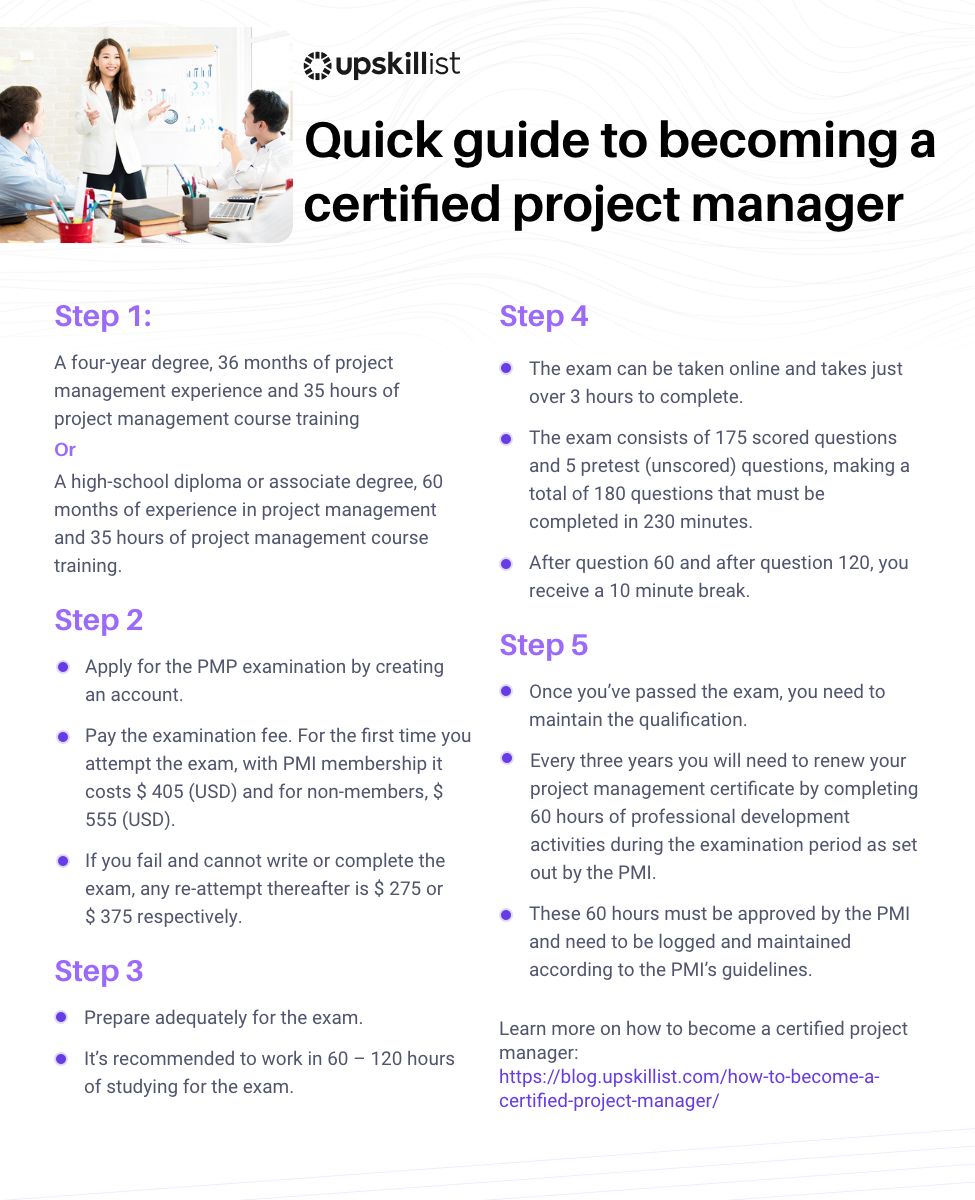
How to become a certified project manager
Some of the biggest projects changed the lives of millions of people all around the world. Whether it’s a road in a remote area to give people access to food and water, the tallest skyscraper or the mass production of a vaccine – there are an endless variety of options and procedures to choose from to achieve the goal. Project management ensures that the best decisions are made to ensure that the project achieves the end goal within the boundaries of the budget and timeframe. Let’s dive a bit deeper into project management as an industry and how you can be a part of it!
1. What is project management?
Project management is when specialised knowledge, skills, tools, and processes are used to provide something of value to others. Typical projects include developing software to improve a manufacturing process, the construction of a new building or factory, expanding a business’ interests into a new geographic market, or relief and rescue efforts after a natural disaster. All of these are projects where the management of it greatly determines the success of the effort.
All projects are an attempt to produce value through a unique product, service, or outcome. There is also a beginning and an end to every project. There is a team, a budget, a timeline, and a set of goals that the team must achieve. The most significant distinction between a project and what we would call “ordinary operations” is that projects end once the goal has been met.
Projects are distinct from day-to-day operations and occur when a company wishes to offer a solution to an endeavour within a certain budget and timeline. Projects necessitate the teams of people to work on certain project goals. As a result, to have a successful project, you require efficient cooperation from all the teams.
If this is what we regard as a project, then what do project managers do?
2. What does a project manager do?
Standard project management techniques are used to plan and control activities, budgets, and timelines, as well as communicate with the many stakeholders and manage risks. These procedures are normally followed throughout the duration of the project.
Within the entire project lifecycle, there are also several stages of a project that will have a defined start and finish. Although projects might differ in size, scope and industry, or even change during the project, project managers perform regular tasks and processes to ensure success. Let’s look at a few core tasks that project managers are responsible for:
- Determining what work has to be done, when it needs to be done, and who will be responsible for it;
- assessing and managing the risks associated with a certain project;
- ensuring that tasks are completed to the highest possible standard;
- to motivate the teams working on the project;
- to coordinate work done by a variety of teams and individuals
- ensuring that the project is completed on schedule and within budget;
- managing project changes as they arise;
- and ensuring that the project achieves the desired goals and successes.
3. How much do project managers make?
To know how much a project manager makes, you need to distinguish between a certified and a non-certified project manager. Project managers get to work on big projects and often in real time see the difference the project has made to the community or organisation involved. Besides the rewarding outcomes, remuneration and job availability in the USA and EU are at an all time high, with some salary earners raking in well over $ 100 000 a year in salaries. In the US, the average project manager can expect a salary range of between $ 93 000 to $ 140 000 with a mean annual salary of $ 116 000 per annum. Average project managers make a median of $ 93 000, but PMP certified project managers make a median annual salary of $ 123 000.
A rewarding job with the prospect of a healthy and prosperous future.
4. How to become a project manager
Requirements:
Becoming a project manager has two routes that you can take. Either you need to study a four-year degree relating to project management, or you need to complete at least your high-school diploma and get work experience by leading projects. Once you’ve got your foot in the door, projects will become bigger over time, and with hard work your responsibilities and earnings will also increase.
Skills:
The Project Management Institute (PMI) recognises the core competencies of a project manager: knowledge, proven experience and personality.
Knowledge:
In every management role, general management abilities such as “leadership, negotiation, communication, team building”, and other human resource management skills are required. Secondly, the PMI recognises project management areas, as well as the tools that are utilised in those areas, such as project scope management, project time management, and project cost management. The last facet of knowledge incorporates industry-specific management expertise, such as product development techniques and lifecycle management.
Proven Experience:
The track record, hours of project management experience, size and complexity of projects managed, and independent references are all part of the proven experience competency area. Years of experience may not automatically imply a high level of competence.
Personality:
Personality traits such as a can-do attitude, confidence, enthusiasm, open mindedness, flexibility, and personal integrity make up the first pillar. People management abilities such as communication, motivation, influence, and political sensitivity are included in the second pillar. For project managers, the political sensitivity trait is critical. Politics is inextricably linked to projects because they are multifaceted. The trick is to be aware of politics, to collaborate with them, but not to become involved in them.
5. How to become a certified project manager
The penultimate goal of your journey to become a certified project manager, is to obtain the Project Management Professional (PMP) certificate from the Project Management Institute (PMI). The PMI is a global association registered by the International Standards Organisation (ISO) under ISO 21500:2012 which provides guidelines and standards for the PMP certificate administered by the PMI.
According to the PMI, PMP certificate holders earn an annual median salary of $ 123 000 per year, whereas they earn $ 93 000 if they do not.
The requirements are straightforward and can be achieved with hard work and diligence.
- The first requirement is to have received at least 35 hours of project management training. This is defined as coursework that particularly addresses project management learning goals. You can get an exemption from this if you obtain a Certified Associate in Project Management (CAPM)® certificate instead.
- If you have a four-year project management degree, you need 36 months of project management experience, but if you have a high school diploma or an associate’s degree, you need to have 60 months of project management experience as project leader.
Once you’ve obtained the certificate, your qualification is valid for three years, with the option to renew or maintain the qualification. All you need to do is to spend 60 hours on an “accepted professional development activity within the given timeframe”.
By now you are probably wondering, how long does it take to become a project manager? Well, to get your project management certification, or PMP certification, you need to follow and complete these steps:
Step 1
- A four-year degree, 36 months of project management experience and 35 hours of project management course training.
OR
- A high-school diploma or associate degree, 60 months of experience in project management and 35 hours of project management course training.
Step 2
Apply for the PMP examination by creating an account to make the application. Here you’ll also need to pay the examination fee. For the first time you attempt the exam, with PMI membership it costs $ 405 (USD) and for non-members, $ 555 (USD). If you fail and cannot write or complete the exam, any re-attempt thereafter is $ 275 or $ 375 respectively.
Step 3
Prepare adequately for the exam. It’s recommended to work in 60 – 120 hours of studying for the exam, which can take weeks or months depending on how much time you have available. Rather start sooner than later.
Step 4
The exam can be taken online and takes just over 3 hours to complete. Since its update in 2021, the exam consists of 175 scored questions and 5 pretest (unscored) questions, making a total of 180 questions that must be completed in 230 minutes. After question 60 and after question 120, you receive a 10 minute break. This allows you to freshen your mind, grab a glass of water and continue with the online exam.
Step 5
Once you’ve passed the exam, you need to maintain the qualification. Every three years you will need to renew your project management certificate by completing 60 hours of professional development activities during the examination period as set out by the PMI. These 60 hours must be approved by the PMI and need to be logged and maintained according to the PMI’s guidelines.
Are you interested in project management? Check out our Project Management Course.




